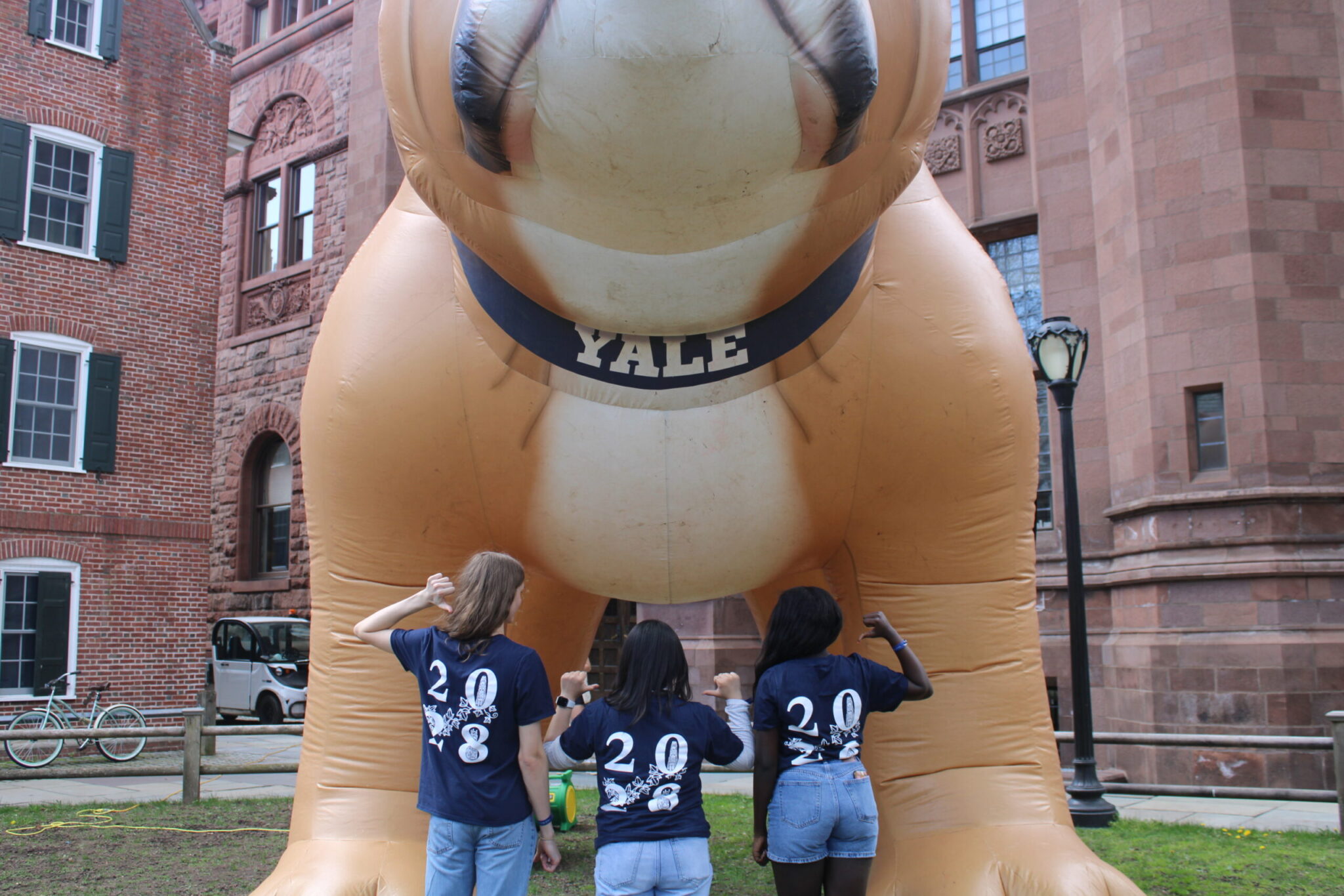Admissions office hosts Bulldog Days with fewer prefrosh
Over 1,300 prospective students are visiting Yale’s campus this week for the program, which the Admissions Office intentionally downsized from last year’s 1,400.

Chloe Edwards, Photography Editor
Campus is busier than usual this week, with over 1,300 prospective Yalies and their parents visiting for Bulldog Days, an annual event that brings admitted students to Yale’s campus for three days of programming.
Last year’s Bulldog Days was the largest ever, with over admitted 1,400 students in attendance. This year’s event is slightly smaller, with just over 1,300 students coming to scope out Yale College this week.
This year’s Bulldog Days is the third in-person iteration of the program since the COVID-19 pandemic. Throughout the three-day event, admitted students will have the opportunity to take part in 250 events, 150 of which are run by current students and student groups.
“This is an amazing campus-wide effort,” Mark Dunn ’07, the senior associate director for outreach and recruitment at the Office of Undergraduate Admissions, said. “The scale of the operation and the number of people who need to be involved is pretty impressive. We just are so appreciative of how many students, faculty and staff continue to step up and really kind of roll out the red carpet for our admitted students.”
According to Dunn the downsizing of Bulldog Days from last year is “by design” and can be attributed to multiple factors, including that Yale admitted fewer applicants this year than last. The College admitted 2,146 students to the class of 2028, down 129 from the 2,275 students admitted to the class of 2027.
Another reason that fewer potential Yalies are attending Bulldog Days this year is that they have opted to take part instead in Bulldog Saturday, a day-long alternative to Bulldog Days on April 20. During Bulldog Saturday admitted students and families will have the chance to visit the College and partake in activities during the weekend. This year is the first year since before the COVID-19 pandemic that the admissions office has offered Bulldog Saturday. According to Dunn, nearly 300 admitted students will visit campus for Bulldog Saturday this year.
This year’s Bulldog Days also comes amid a week of intense protest across campus, including the “Occupy Beinecke” sit-in, a Yale Police union rally and leaflet campaign and a hunger strike that began on April 13.
While the weekday Bulldog Days programming will have a lower attendance than last year, the total number and percentage of admitted students coming to campus for April programming has increased. This year, roughly 1,600 students, or 75 percent of the admitted class, will attend Bulldog programming, whereas last Bulldog Days saw roughly 63 percent of the admitted class.
“There’s a level at which we reach capacity,” Dunn said. “In dining halls, or in terms of getting students to host. We made work last year, but this year we were all feeling like reducing the number a bit would just be a lot more comfortable.”
Of the 1,300 prefrosh who came to campus, 900 are staying with current students with whom they were connected by the admissions office. According to Dunn, 500 current students signed up to host a prefrosh. The remaining admitted students found their own accommodations.
“I had such a wonderful experience at Bulldog Days last year, so I wanted to pay it forward and host some prefrosh this year,” said Crawford Arnow ’27, whose suite is hosting three prefrosh. “I just want to do my part in sharing my love for Yale with prospective students.”
Among the most popular Bulldog Days events are the two student showcases in the Shubert Theatre on Monday and Tuesday evenings. Each performance will have about ten student groups performing each night, Dunn said.
This year’s Bulldog Days also is the first since the Supreme Court banned affirmative action in higher education last June. While admissions officers involved in the application reading process will not have access to information about the racial makeup of the admitted class of 2028 until after all spots on the waitlist have been granted, other employees who do not read applications do have this information.
These employees were able to share racial demographic data about the admitted student class with Yale’s cultural centers, which run many popular Bulldog Days programs, according to Dunn. While access to information about students’ self-identified race may be useful to the cultural centers in directing their Bulldog Days outreach, Dunn “encourages everybody” to engage with the cultural centers’ programming.
As in years past, the admissions office hosted a Bulldog Days fly-in program, wherein costs of travel are covered or subsidized for domestic students who qualify. According to Dunn, more than 600 admitted students qualified for the fly-in program.
Travel coverage can range from a metro ticket from New York City to multi-stop flights from Hawaiʻi, Dunn said.
“We think it’s essential that all of our students have the chance to visit campus before they make their decision, especially students from lower income backgrounds, who are less likely to have visited before applying,” Dunn said. “It’s important to invest the money, the staff energy and the time into ensuring that they can do that. It’s quite an operation; it’s like we’re running a travel agency out of the admissions office.”
In the past, one of the biggest student concerns about Bulldog Days was the lack of swipe access granted to prefrosh, according to Chandler Houldin, senior assistant director in the admissions office and director of the Bulldog Days program.
While prefrosh are able to scan into residential college dates and dining halls, they do not have access to entryways. According to Houldin, this decision is to maximize the safety of both prefrosh and current students.
Yale’s acceptance rate for the class of 2028 was 3.7 percent, the lowest ever.







